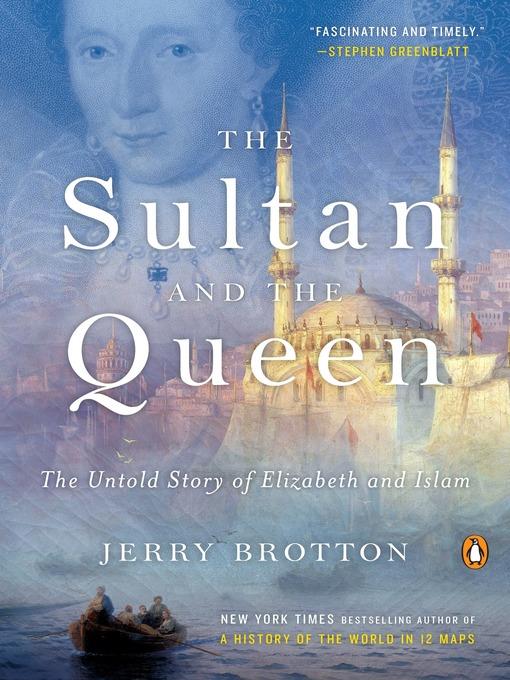
The Sultan and the Queen
The Untold Story of Elizabeth and Islam
- اطلاعات
- نقد و بررسی
- دیدگاه کاربران
نقد و بررسی

August 8, 2016
Brotton (Great Maps), professor of Renaissance studies at Queen Mary University of London, details the difficult diplomatic shifts Elizabeth I maneuvered in the wake of her excommunication in 1570. Having lost much of her previous access to Catholic commerce, Elizabeth found new connections in fellow Protestant lands as well as the Islamic world, notably the Ottoman Empire. An unstable triangle of Protestant-Muslim-Catholic alliances followed. Brotton successfully details the “unlikely” alliance through intriguing portrayals of England’s first ambassadors to Iran, Morocco, and the Ottoman Empire, noting the uneven growth of trade between the island nation and Muslim powers. Thanks to the greater number of resources from the Western travelers, the narrative remains strongest when focusing on the East, but Brotton offers a glimpse of the impressions Muslim diplomats and traders made when visiting London. He also explores their impact on British culture through the evolution of characterizations in Elizabethan theater, especially the works of Marlowe and Shakespeare. The book’s true action occurs in smoothly written descriptions of delicate negotiations set in the East, highlighted with the attempts by Protestant, Catholic, and Muslim rulers to pit rivals against one another. Brotton blends meticulous research with a deft touch of the mysterious, resulting in a fascinating shared history of East and West.

July 15, 2016
An intriguing look at England's contact with the Ottoman Empire and its enormous influence on Elizabethan commerce and culture, especially the theater.Brotton (Renaissance Studies/Queen Mary Univ. of London; A History of the World in 12 Maps, 2013, etc.) explores the fascination of Britain with the Islamic world before Queen Elizabeth first wrote to the young sultan, Murad, in 1579, in response to his granting of commercial privileges to the English merchant William Harborne. During the reign of her father, the English world was crazy about commodities from the Islamic world, such as sugar and indigo as well as rich silks and textiles. Yet over the next 17 years of Elizabeth's reign, the commercial and cultural contact intensified, especially as the Protestant queen, excommunicated by the pope in 1570, used the exchange to wily purpose in countering the Catholic opposition to her reign, especially from Spain, against which the Moroccan sultan Ahmad al-Mansur proposed a military alliance in 1600. The Catholic world excoriated Elizabeth for her alliance with the Turkish "heathens" (as did plenty of internal critics), yet she was clever in the keeping of peace and prosperity considering Ottoman Turkey was a world military power and England a fairly insignificant player on the stage. Brotton looks into the early English travelers to that fabled land of the Mahometans or Moors (the term Muslim was not yet being used)--e.g., the young merchant Anthony Jenkinson, who became head of the new Muscovy Company and traveled to meet and charm the Moorish leaders; Harborne, the "apt man in Constantinople" who navigated the Anglo-Ottoman Capitulations of 1580; and the vainglorious Sir Anthony Sherley, who gained a mention in Shakespeare's Twelfth Night. In several chapters Brotton explores the Elizabethan theater's fairly stereotyped representations of the Moors, culminating in Shakespeare's fully fleshed, sympathetic Othello. An erudite work that presents a fresh facet to Elizabeth's reign.
COPYRIGHT(2016) Kirkus Reviews, ALL RIGHTS RESERVED.

September 15, 2016
History watchers know that 2016's Brexit doesn't mark the first time England has divorced itself from Europe. With the Protestant Queen Elizabeth I's excommunication in 1570, England looked to the south (Morocco) and east (the Ottoman Empire and its enemy, Persia) for new allies in trade and war. In this work, Brotton (A History of the World in 12 Maps) tells the story of England's daring, often misguided attempts to bridge the physical, cultural, and political divide among empires. The author brings the nuanced account to life with an abundance of primary source material--correspondence, dramas, and histories of the day--and readers will want to take the time to parse the 16th-century language. The result is a vivid picture of the era's military vicissitudes, shifting alliances, xenophobia, and fascination with an Islamic world that wielded far more power than Elizabethan England. These machinations, powered by a colorful cast of diplomats, pirates, historians, playwrights, and politicians who distrusted yet needed one another, offer a window into a complex early chapter of East-West relations. VERDICT This microlevel history for nonhistorians is strong on realpolitik; not a quick read but a rewarding one.--Lisa Peet, Library Journal
Copyright 2016 Library Journal, LLC Used with permission.




دیدگاه کاربران